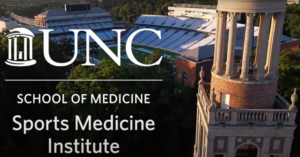
Keeping active people active is an ongoing process. At the UNC Sports Medicine Institute (SMI), a dedicated, inter-disciplinary team of medical providers and clinical researchers uses state-of-the-art tools, technology, and novel techniques to help community and University members preserve and return to active lifestyles.
Launched in February 2020, the SMI was conceptualized by individuals within UNC Orthopaedics, UNC Exercise and Sport Science and other University sports science leaders as an entity that would close a gap by optimizing collaborative care and inter-disciplinary research. Through enhanced clinician-researcher collaborations, the SMI provides innovative, comprehensive care pathways that focus on prevention, performance, and recovery from a broad patient-centered approach. 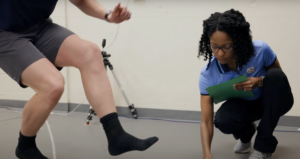
Federal, foundation, and industry-funded clinical trials developed and led by the SMI’s clinical research scientists and medical providers offer patients treated at the SMI with an opportunity to participate in studies that may enhance their outcomes and benefit the treatment of future patients. The fruits of innovative clinical trials in turn enable clinicians to help patients return to active lifestyles and reduce potential long-term disability via cutting-edge patient care.
SMI Co-Directors David Berkoff, MD (Vice Chair of Clinical Operations and Division Chief of the Non-Operative Sports and Musculoskeletal Medicine) and Brian Pietrosimone, PhD (Director – UNC EXSS MOTION Science Institute) and their respective UNC Department Chairs (James Sanders, MD – UNC Orthopaedics / Darin Padua, PhD – UNC EXSS), as well as faculty from other departments within UNC’s School of Medicine and Gillings School of Global Public Health, were instrumental to the SMI’s inter-disciplinary development.
Dr. Berkoff noted: “No sports injury is treated by a single discipline. The SMI’s mission is to enable UNC Health providers to apply novel investigative approaches to individualized clinical care in order to help patients accelerate their recovery and return to active lives. We focus on keeping active patients active as our primary clinical mission, whether we’re working with youth, weekend warriors or professional athletes. Sports medicine doesn’t stop at treatment. Our clinical and research teams invest themselves in helping patients understand the treatment, rehabilitation, and prevention tenets of holistic injury recovery that lead to better outcomes.”
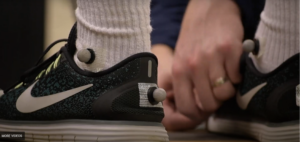 Dr. Pietrosimone stated: “The patient population treated by our sports medicine disciplines drives the SMI’s investigative work and comprises the core of the Institute’s clinical trial enrollment. It’s exciting to watch individuals treated and rehabilitated for athletic injuries witness how participating in [SMI-sponsored] trials helps uphold clinical research that leads to innovative sports medicine practice at UNC Health.”
Dr. Pietrosimone stated: “The patient population treated by our sports medicine disciplines drives the SMI’s investigative work and comprises the core of the Institute’s clinical trial enrollment. It’s exciting to watch individuals treated and rehabilitated for athletic injuries witness how participating in [SMI-sponsored] trials helps uphold clinical research that leads to innovative sports medicine practice at UNC Health.”
The SMI leadership team meets regularly to discuss and develop ideas and initiatives. Both University and regional partners who join the core team members are critical to enhancing the SMI’s evidence-driven, wide-reaching clinical science activities. Collaborators include UNC’s Athletic Department; UNC Gillings School of Global Public Health; UNC Medical Center Rehabilitation Services therapists; UNC Thurston Arthritis Research Center; UNC Injury Prevention Research Center; the UNC/NCSU Joint Department of Biomedical Engineering; and North Carolina State University’s College of Veterinary Medicine.
Across wide-ranging clinical trials, the SMI tracks and analyzes injury outcomes and indicators among research participants. In 2022, clinical investigations included: tracking post-operative outcomes via repeated measures; motion analysis and movement retraining; exploring medication application; novel interventions to optimize post-operative outcomes; injury prevention program implementation; identifying biomarkers correlated with medical conditions; and investigation of post-injury tissue quality. Additional SMI initiatives include integrating nutritional information into patient care, developing patient resources, and expanding clinical research opportunities. 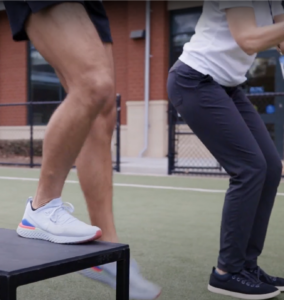
SMI Post-Doctoral Research Associate Caroline Lisee, PhD, ATC, noted: “Being part of a unique, collaborative clinical-research community has prepared me for an exciting career. Both mission and mentoring at the SMI builds confidence that my own clinical studies will produce meaningful findings that enable sports medicine practitioners to offer injured patients the best in treatment, rehabilitative and preventive care.”
SMI Assistant Director Carla Hill, PT, DPT, OCS, is a vital leader, organizer and promoter of the Institute’s mission and development. Hill highlights SMI activities on social media, leads event planning, participates in research project implementation, and assists in growing its network of collaborators to achieve goals. She joins fellow leadership team members who are driven to improve patient care through integrating clinical research and connecting patients to providers and resources that best meet their needs.
Hill stated: “In less than a year with the SMI, I’ve witnessed how collaboration among related disciplines can foster new ideas for treatment and research that enhance our patients’ return to active lives after injury.”
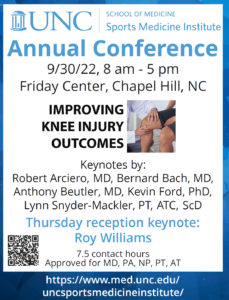 On September 30th, the first UNC Sports Medicine Institute Annual Conference will be held at UNC’s Friday Conference Center. The event will feature keynote presentations by sports medicine leaders from around the country and a kick-off talk from Hall of Fame basketball coach Coach Roy Williams. The day-long conference will feature panel discussions dedicated to surgery, nonoperative management, rehabilitation and recovery, and teamwork in sports medicine.
On September 30th, the first UNC Sports Medicine Institute Annual Conference will be held at UNC’s Friday Conference Center. The event will feature keynote presentations by sports medicine leaders from around the country and a kick-off talk from Hall of Fame basketball coach Coach Roy Williams. The day-long conference will feature panel discussions dedicated to surgery, nonoperative management, rehabilitation and recovery, and teamwork in sports medicine.
In its third year, the SMI is focused on growing its clinical and research enterprise.
Dr. Pietrosimone noted: “One of our biggest aims is to grow study enrollment within the SMI. Patients, clinicians, and researchers working together will lead to high-level discoveries that will in turn improve future clinical care.”
Dr. Berkoff concluded: “Our achievements continue to grow thanks to the enthusiastic contributions of our clinical and research partners. The SMI will grow fueled by the enthusiasm and contributions of this entire collaborative team. We endeavor to provide care in a different way and impact research on a new level.”
